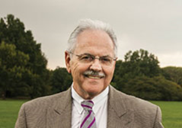Leo Shea

Back to All Sociology and Anthropology Spotlights
1966Meditating alone this past winter in a campus chapel that he last sat in as an undergraduate 46 years earlier, Leo Shea ’66, a prominent neuropsychologist and man of the world, mentally compared the work-in-progress he was then to the one he is today.
“I remembered how the chapel was first built when I was a student here and I thought it was horrible,” Shea said after a campus visit in February to talk with psychology students. “But going in there now I thought it was quite a wonderful, soaring space. It shows the architect was right and I was wrong.”
It shows, too, how nearly five decades encountering a full menu of human experience through business, politics, pastoral counseling and clinical neuropsychology, from London and Paris, Kuwait and Saudi Arabia to Washington, DC, New York, Miami and Latin America, can elevate or humble a man’s perspective on all sorts of things.
“It is only through willingness to commit to the courageous search for transparency, for self-enlightenment, that one can build the resiliency that allows one to negotiate this world,” Shea said, summarizing a message he tried to impress on students in Dave Landers’ psychology practicum class.
Shea, a Boston native and New York City resident who now frequently testifies as a neuropsychological profiling expert for big-headline murder cases, said his own search for life’s answers hit full early stride under the sway of cosmopolitan and generous Saint Michael’s mentors. Recalling his time with them reminds him now of the apostles on the road to Emmaus failing to perceive God’s direct interactions among them until much farther along the road.
He smiles at the thought of his 1962-66 self, a sociology major earnestly devoted to that era’s Great Books curriculum and a sworn foe of cultural provincialism. “I do cherish memories, but just don’t have to relive them to value them,” he says, explaining how career demands and far flung postings precluded earlier returns to campus.
Those memories swept back grandly and from the heart as Shea walked solo around campus at twilight. “As I stood outside Founders Hall and looked at the landscape that meanders to Mount Mansfield, I thought of Rev. Lorenzo D’Agostino [who] challenged us to traverse each mountain, see each rock as a stepping stone and not a stumbling block,” he says. He passed Cheray Hall and thought of George Olgyay, “whose traumatic family experiences in pre-and post-war Europe immigration struggles told a story of resilience in the face of evil.” Walking by Jeanmarie Hall, he remembered “the brilliant raconteur Marie Henault,” an English professor who demanded (and gave) excellence. “She reminded us that learning was lifelong and demanding, but enjoyable and valuable too – and that achievement had to be tempered with humility to be of value to others.”
Noticing shafts of light from Durick Library’s upper windows illuminating the quadrangle, he thought of the college’s first official campus minister, Father Nelson Ziter, SSE “with his embracing Lebanese invitation to each of us to allow him to be part of our lives. There was purity in him that was enviable, and an unconditional love that was transformative.”
Shea’s enlistment in the Navy after graduation to fulfill his duty during the Vietnam era launched Shea’s world explorations. He served two years before joining Ryder, eventually headed the company’s international development efforts and five divisions involving transportation, warehousing, academics, entertainment and banking. He then went to Kuwait to be a senior VP of a large conglomerate, “shuffling between London, Paris, Rome, Middle East, Africa, New York and Houston,” then back to Miami to represent a Saudi group pursuing business opportunities in the U.S.
That enabled him to start a business consulting firm, which connected him to a Cuban businessman who was one of the largest importers of bananas in America. Shea became his consultant soon after that businessman was appointed during the 1984 election to run “Viva ’84” in Florida, focused on rallying Hispanic support for Reagan.
While working in Miami, Shea, who speaks fluent Spanish, did volunteer parish ministry with Cuban and other Latino immigrant youth. The experience inspired him to go back to school part-time for a master’s in Hispanic Pastoral Ministry/Liberation Theology, then for an education master’s in counseling psychology in 1989 and an M.S. in clinical psychology in 1991.
Shea arrived at New York University for a clinical psychology internship in 1991 and has had an affiliation there ever since. He worked for the United Nations Development Program Asia in 1994 and in 1995 he completed his doctorate with dual specialty in clinical psychology and neuropsychology. He’s now clinical associate professor of rehabilitation medicine at NYU, with offices for private practice in New York and Boston. His work centers on evaluating neuropsychological conditions from brain injury, tick-borne illnesses (primarily Lyme disease) and other neurological conditions.
The specialty makes him a much-sought consultant in capital murder cases when a defendant’s neuropsychological profile bears on a verdict or sentencing. Shea says that “This field ultimately is not about feeling good, though we all want to feel good, and it’s not really research – it’s ‘me-search” he said. “Have you come to terms with who you are and how you want to make your impact in your world? Only then can you help others. They’re coming to you for some definition, and what you offer is sacred space where that can take place.”